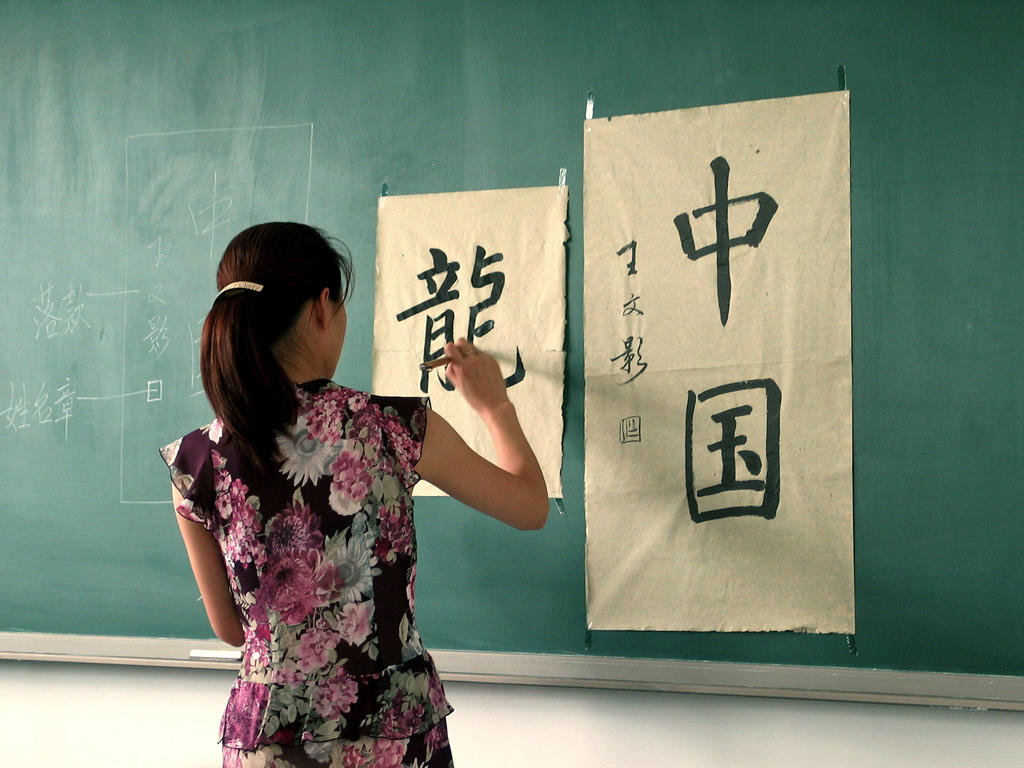Because of how difficult learning Chinese is, you'll probably need to work with a Chinese teacher who's spent time living in China or work with a native Mandarin speaker.
Today, we're going to look at how you can find the perfect Chinese teacher and good Chinese classes.

Choosing Your Chinese Teacher
Make sure you do your research when looking for Mandarin lessons. Take the time to compare the different tutors and teachers out there rather than just picking the first Mandarin teacher you find.
Language exchanges can also be useful. Have a look to say if there are Chinese exchange students looking to offer private Mandarin lessons in exchange for some time getting to practise their English.
It can help a lot to know what you're looking for before you start your search, too. Make a list of your requirements:
- What are your personal goals? Do you want to master the language, pick up some expressions before travelling to China, chat with native speakers, or learn how to write in Chinese?
- What kind of class are you looking to attend? Evening classes, an intense course, an introduction to Mandarin, Chinese calligraphy, pronunciation tutorials, etc.?
- Why are you learning the language? Are you going to use it for work, a trip to China, for fun, studying abroad, or taking a Chinese exam?
- Do you want to speak Chinese fluently or just get the basics?
- Or maybe you're thinking about becoming a Chinese language teacher...

There are as many reasons to learn Chinese as there are Chinese students. It's important that you find a Chinese tutor that's competent, experienced and, most importantly, one who delivers on what they promise.
So what's the best way to find the perfect Chinese tutor?
There are Chinese tutors for all levels and ages including tutors for primary school children, university students, or adults looking to start learning a language. You can find tutors working at places like the Confucius Institutes, Chinese exchange students at universities, and private tutors here on the Superprof website.
For Chinese, it's recommended that you look for tutors with at least three years more experience than their students. Even absolute beginners will want their tutors to have studied Chinese for three years because that will be just enough to really start to grasp the writing system.
In a Chinese dictionary, you can find over 100,000 Chinese words, but you only really need to learn around 5,000 Chinese characters to be able to get by.
You'll likely start by learning the Chinese characters for saying hello (ni hao, 你 好), good-bye (zài jiàn, 再 见) and thank-you (xièxie, 谢谢, pronounced “shay-shay”).
A few things you should look for in your Chinese teacher:
- Completion of the HSK (Hanyu Shuiping Kaoshi), a Chinese language exam.
- A good understanding of Chinese culture.
- Excellent listening skills.
- The ability to adapt their lessons to their students.
- Familiarity with common Chinese vocabulary
On the Superprof website, for example, you'll be able to check out the profiles of Chinese tutors. You'll see that a lot of them have a few things in common like:
- Having earned a teaching diploma in China or at a local university.
- Local tutors who've spent time in China or Chinese nationals who are spending time in New Zealand.
- Non-native speakers with a teaching certificate in Mandarin or native Mandarin speakers.
- Tutors offering classes for different levels either in person or online.
All of these are also factors that can influence the price of their tutorials.
The Cost of Mandarin Lessons
Foreign language lessons aren't free.
There's no set price for private tutors as they choose their own fees and a lot is down to supply and demand. The more experience they have, the more they tend to charge, too.

But how much does a home Chinese lesson cost?
The average Chinese tutor charges somewhere around $30 an hour.
The cost of a Chinese-language tutor will depend on a few factors such as:
- Where they are
- What level they are
- What level they teach
- How many years of experience they have
- How many lessons you pay for (some will offer a discount for block-booking)
For example, on Superprof,
On Superprof, the prices for a Chinese tutor tend to range between $20 and $50 an hour with tutors offering their first lesson for free.
So is learning Mandarin just for rich people?
There are cheaper options available if you're on a budget or not willing to pay the rates being charged by tutors.
Language schools or online tutoring tend to be more affordable.
In some cases, however, this can be a false economy.
With language schools, you'll have to pay for several lessons at once and learn alongside other students. This means that you'll have to spend more money in total.
However, this does mean that you're forced to commit to more lessons, which is good if you tend to try new things and give up too soon.
As these are lessons with several students, they tend to be cheaper per hour than private tutoring, but they won't come with the benefits of being the only student in the class. Language schools also take the worry out of finding legitimate teachers since some tutors can overexaggerate their own skills, especially on their profiles.
Still too expensive?
You can always look to Chinese exchange students and see if they want to offer Mandarin lessons in exchange for practising English with you.
You can save money by looking to online lessons and tutorials as tutors can charge less as they don't have to worry about travel costs.
Finally, there are also apps and websites where you can learn Chinese online for free.
How to Prepare for Your Chinese Lessons
Learning to read and write Chinese is incredibly difficult and speaking the language can be even harder. You should always prepare for your Chinese lessons so that you get the most out of them.
Here's what you need to do.
- Pay attention and actively listen during your lessons.
- Go back over your lessons when you're outside of class to improve your memory of the session.
- Regularly revise what you've studied during your lessons.
- Eat healthily, sleep well, and stay hydrated. A healthy body leads to a healthy mind.
- Avoid distractions
- Make revision resources like flashcards and notes.
- Try using mnemonic devices if you struggle to remember things.
To learn Mandarin, you'll need to learn phonemes, grammatical structures, and rules that aren't present in English. It can help to see and hear as much Mandarin as you can.
How to Immerse Yourself in Chinese from New Zealand
Immersion is one of the most effective ways to learn a language. When studying Chinese, make sure you're watching Chinese movies, reading Chinese books, and listening to Chinese music.
It doesn't matter too much if you don't understand all of it. You'll get more familiar with the sounds, the characters, and even the pronunciation.

Immersion will also teach you more about Chinese culture and history before you even go to China. To take immersion even further, though, you'll have to go to the country.
What is a language exchange?
Language exchanges are a great way to practise a language for free by speaking with a native speaker of the language you want to learn. A native Chinese speaker will help you with your Chinese while you help them with their English.
Ways to Complement Your Chinese Classes
Chinese is famously difficult because of tones and pronunciation. Just a few hours of lessons each week won't be enough to quickly learn Chinese.
Here are some tools to help improve your command of the Chinese language.

Websites and Apps to Help You Learn Chinese
There's no way that we could possible list all the tools and resources out there to learn Chinese, but here are a few that we like:
- Hello Chinese
- Mondly
- Pleco
- Skritter
- Line dictionary
- Mandarin Madness
- Learn Chinese Mandarin Phrasebook
- Chinese Tools
- Mosalingua
- The BBC
- Chinese Learner
- FluentU
- The Chairman’s Bao
- Chengyu
How to Find a Chinese Language Exchange
There are quite a few sites out there where you can search for language exchanges by language and location. There are also sites that offer language learning resources like dictionaries, forums, lesson plans, etc.
- My language exchange uses the Cormier method: learn the Chinese language by taking part in linguistic workshops of two to four people. The site allows beginner Chinese students to exchange e-mails and offers video chats for more advanced students. This resource is mainly for students at an intermediary level and won't be of much use to absolute beginners.
- Conversation Exchange is another free site that can help you find Chinese people wanting to learn a European language such as French, English or Spanish through conversation.
These sites make it possible to learn a language in a social context.
How?
By meeting at a bar or cafe, for example, and speaking half the time in English to teach it to your language partner, and half the time in Chinese so you can learn.
By learning this way, you'll also learn to speak the way native speakers really do, learn about their culture, and maybe even discover amazing new Chinese recipes!
Summarise with AI:
























